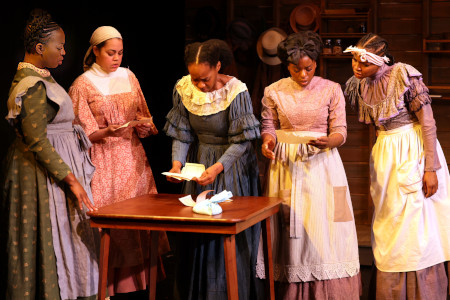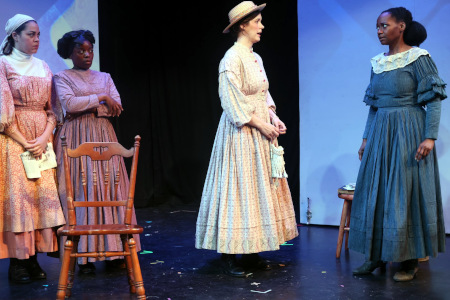
|
Beate Hein Bennett
Airing Other People’s Dirty Laundry
Once again, the New Federal Theatre is presenting a play about an event in American history that is part of the untold or under-told larger story of this country. The New Federal Theatre was founded in 1970 by Woodie King, Jr. and is now led by his wife, Artistic Director and actor Elizabeth Van Dyke. It is a New York City theater institution that has been pioneering the works of African American and other minority playwrights with superbly crafted productions for the past fifty-five years. The play “The Wash” by Kelundra Smith, based on historical fact, is set in Atlanta in 1881 and portrays the remarkable resourcefulness of a group of Black laundry women who demand fair wages for their work and initiate a strike to fight for their just demands against their mostly white employers who routinely stiff them of their wages. In the play, a close-knit group of five black laundresses who work together finally decide they will no longer be cheated. Under the leadership of the mature and articulate Anna, the others join ultimately with various levels of enthusiasm, hesitation, fear, and courage. To their surprise, a white laundress comes to their meeting wishing to join their strike action. Initially the group of Black women distrusts the white colleague-in-misery until she proves her mettle by organizing laundresses in other parts of Atlanta, and even black porters—men-- are inspired to organize. (This first labor action in Atlanta inspired the subsequent nation-wide labor union movements.) The play ends with a gesture of dedication to this courageous group of women who overcame their racial divide and together worked for the beginnings of equal pay for equal work, a core principle that has yet to be completely attained 150 years later. And Congress has yet to ratify the Equal Rights Amendment! Director Awoye Timpo and choreographers Adesola Osakalumi and Jill M. Vallery have created a spirited production of this well crafted play with six superb actresses in a space that has been ingeniously devised by Scenic Designer Jason Ardizzone-West. Upon entering the audience first sees two large white panels angled to look like an abstract cube. Projections of floating geometric shapes and grayish spots, designed by Abhita Austin, enliven these panels on which historic newspaper clippings about the 1881 strike are projected later in the show. The actors move the two panels and set pieces during the show to reveal the living/working quarters of the women. The architectural craftsmanship and well chosen materials, with props by Belynda M’Baye, give a feel of lived-in authenticity. The pre-show music selection by Bill Toles sets the tone with the heavy rhythms of traditional blues. Costume designer Gail Cooper-Hecht dressed the women in truly beautiful authentic costumes with the feel of well-worn but neatly taken care of dresses-- some look like they could be their white women customers’ hand-me-downs given in lieu of wages, as is mentioned in the play. The acting ensemble works as an experienced team, not only in moving the set pieces, but how they project the intimacy of a group of women who work with each other in close proximity and share their troubles and joys. However, each actor establishes her own rhythms and persona, and thus the characters are clearly differentiated from each other. The group is led by two dominant older women: Anna, played by Eunice Woods, is the owner of the house where they meet to work; she is a gentle soul who has had her share of soul pain but she is disciplined, strong, and realistic—she becomes the courageous ring leader of the strike. Then there is Anna’s old friend Jeanie, played by Bianca Laverne Jones with a sense of ironic humor and a sharp tongue that can whip anyone to attention—she initially resists Anna’s plan of organizing a strike because she has legitimate fears of it backfiring. However, their initial conflict over the strike does not destroy their deep friendship, and Jeanie ultimately joins the action.
Alicia Pilgrim plays pregnant Charity as a sweet and courageous young woman who immediately goes along with Anna in the hope to help improve the life of her unborn child. Kerry Warren who plays Jewel, the lightest skinned among them (as pointed out by her cohorts), is frequently dispatched with Charity to collect the money from the customers who slam the door in their faces. She becomes angry enough to join the fight from the start. Then there is sweet Thomasine, played by Margaret Odette as a somewhat naïve though hesitant participant who sneaks in work which undermines the strike’s effectiveness. Last not least is Mozelle, the white laundress who joins the effort. She is played by Rebecca Haden initially with shy cautiousness as she finds herself in uncharted waters and confronted by an openly distrustful group of Black women. However, as she shows her determination and effectiveness as a recruiter to the cause, she is fully embraced by the group as one of them. Each actor projects her individual struggle with taking up the challenge to defeat the odds. A blues played pre-show reflects the painful struggle: “You can take my body, you can take my bones, you can take my blood, but not my soul.” Collaboratively, the women overcome their differences and find common cause in improving the lives of many. Kelundra Smith has crafted a zesty rich text—she has her ear on the Black Georgian ground—for actors to fully exploit. The play and this production demonstrate the positive power of imagination and conviction to survive in a hostile world. |
| recordings | coupons | publications | classified |


